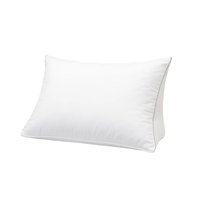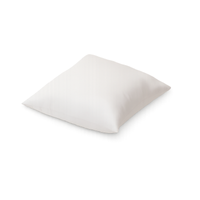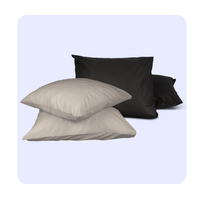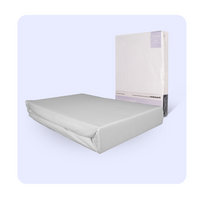In short
|
Quick links to the topics
Bonus tip: consider using a dry cleaning service for certain bedding items, like duvets or pillows.
Tip 1: How often should you wash your bedding?
This depends on a few things, like your personal hygiene, the type of bedding, and how often you use it. As a general rule, you can go by the following:
- Sheets: wash them every week or every other week.
- Pillowcases: wash them every week or every other week.
- Duvet covers: wash them every three to four weeks.
- Duvets: wash or dry clean them every six to eight months.
- Pillows: dry clean them every twelve to eighteen months.
Keep in mind these are just guidelines, and it's smart to look at your own needs. For example, if you sweat a lot at night, you might want to wash your sheets more often. Or if you have pets, you might need to wash your duvet covers more because of all the hair.
Tip 2: Pick the right wash temperature
It's important to pick the right wash temperature for the type of bedding you're washing, because that affects how well everything gets cleaned and how your bedding holds up after washing. Here are some tips for different materials:
- Cotton: you can wash this at high temperatures without damaging it. Wash cotton at 60 to 90 degrees for the best hygiene and to get rid of stains.
- Linen: you can wash this at high temperatures without damaging it. Wash linen at 60 to 90 degrees for the best hygiene and to get rid of stains.
- Synthetic materials: these can be more sensitive to heat and might shrink. Wash synthetics at lower temperatures, between 30 and 60 degrees. You can also use a cold wash program for extra softness and to help prevent shrinking
- Wool: wool is sensitive to heat and can shrink or lose its shape if you wash it at high temperatures. Wash wool at a low temperature, like 30 degrees, or use a cold wash program
Tip 3: Use the right amount of detergent
It's important to use the right amount of detergent so your bedding gets nice and clean, but also to avoid leaving too much residue behind. That leftover detergent can cause skin irritation or allergic reactions.
How much detergent you need depends on how much bedding you're washing and the type of detergent you use. Just follow the instructions on the detergent label and adjust as needed. For example, if you have hard water, you might need to use a bit more detergent to get enough suds to really clean your bedding.
Tip 4: Try adding extras if you want
There are a few things you can add to your wash to get your bedding extra clean or give it a little boost. Here are some options:
- Fabric softener: this can make your bedding feel softer and give it a nice smell. Just use it as the packaging says.
- Bleach: this can help get rid of stains and make your bedding look fresher and whiter. Just follow the instructions on the packaging and remember that bleach isn't good for every fabric, like wool or denim.
Tip 5: Dry your bedding the right way
It's important to dry your bedding the right way so it doesn't shrink or get damaged. Here are a few options:
- Tumble dryer: this is a quick and easy way to dry your bedding, but remember that some materials, like wool or denim, can be sensitive to heat and are better off air dried. Use a low temperature and a gentle cycle for those fabrics.
- Air drying: this is a great option for fabrics that don't like heat, like wool or denim. Just hang your bedding somewhere dry and airy and let it dry completely before you make your bed.
- Ironing: some people like to iron their bedding after washing to make it nice and smooth and get rid of any wrinkles. Just keep in mind it takes more time, and some materials, like synthetics, aren't really made for ironing.

Bonus tip: Think about using a dry cleaning service
Some bedding items, like duvets or pillows, are just a pain to wash or need special care. In that case, it might be a good idea to let a dry cleaner handle it so they get cleaned properly. That way, they'll last longer and stay a lot more hygienic.
Conclusion
Washing your bedding regularly is super important to keep things hygienic and make your bed feel nice and fresh. If you pick the right temperature, use the right amount of detergent, and dry it the right way, your bedding will last longer and stay comfy. You can also try stuff like fabric softener or bleach to get it extra clean or give it a little refresh. And if you find it tricky to wash certain things, like duvets or pillows, it might be worth checking out a dry cleaning service.

















 Continue shopping
Continue shopping






